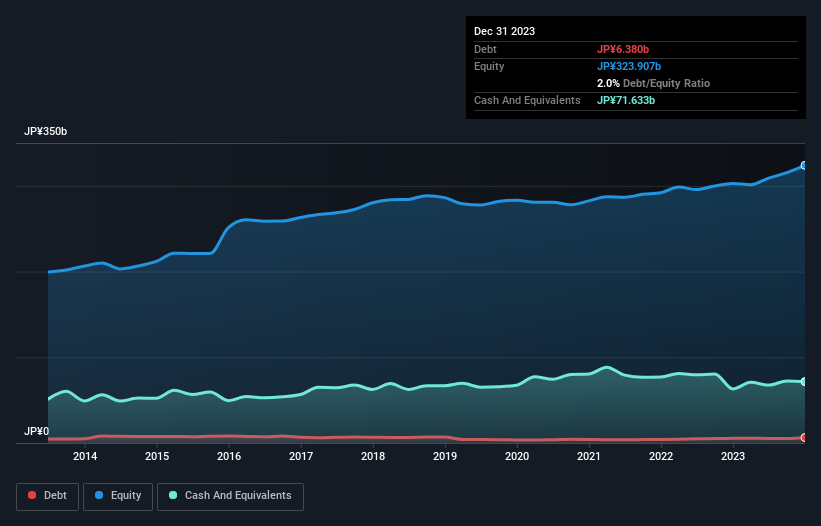These 4 Measures Indicate That House Foods Group (TSE:2810) Is Using Debt Reasonably Well

Legendary fund manager Li Lu (who Charlie Munger backed) once said, 'The biggest investment risk is not the volatility of prices, but whether you will suffer a permanent loss of capital.' So it might be obvious that you need to consider debt, when you think about how risky any given stock is, because too much debt can sink a company. As with many other companies House Foods Group Inc. (TSE:2810) makes use of debt. But the more important question is: how much risk is that debt creating?
When Is Debt Dangerous?
Debt and other liabilities become risky for a business when it cannot easily fulfill those obligations, either with free cash flow or by raising capital at an attractive price. Part and parcel of capitalism is the process of 'creative destruction' where failed businesses are mercilessly liquidated by their bankers. However, a more common (but still painful) scenario is that it has to raise new equity capital at a low price, thus permanently diluting shareholders. Having said that, the most common situation is where a company manages its debt reasonably well - and to its own advantage. The first step when considering a company's debt levels is to consider its cash and debt together.
See our latest analysis for House Foods Group
What Is House Foods Group's Net Debt?
You can click the graphic below for the historical numbers, but it shows that as of December 2023 House Foods Group had JP¥6.38b of debt, an increase on JP¥5.68b, over one year. However, its balance sheet shows it holds JP¥71.6b in cash, so it actually has JP¥65.3b net cash.

A Look At House Foods Group's Liabilities
According to the last reported balance sheet, House Foods Group had liabilities of JP¥62.4b due within 12 months, and liabilities of JP¥42.4b due beyond 12 months. Offsetting this, it had JP¥71.6b in cash and JP¥61.9b in receivables that were due within 12 months. So it can boast JP¥28.8b more liquid assets than total liabilities.
This short term liquidity is a sign that House Foods Group could probably pay off its debt with ease, as its balance sheet is far from stretched. Simply put, the fact that House Foods Group has more cash than debt is arguably a good indication that it can manage its debt safely.
Also good is that House Foods Group grew its EBIT at 14% over the last year, further increasing its ability to manage debt. The balance sheet is clearly the area to focus on when you are analysing debt. But ultimately the future profitability of the business will decide if House Foods Group can strengthen its balance sheet over time. So if you want to see what the professionals think, you might find this free report on analyst profit forecasts to be interesting.
Finally, a company can only pay off debt with cold hard cash, not accounting profits. House Foods Group may have net cash on the balance sheet, but it is still interesting to look at how well the business converts its earnings before interest and tax (EBIT) to free cash flow, because that will influence both its need for, and its capacity to manage debt. In the last three years, House Foods Group's free cash flow amounted to 29% of its EBIT, less than we'd expect. That's not great, when it comes to paying down debt.
Summing Up
While it is always sensible to investigate a company's debt, in this case House Foods Group has JP¥65.3b in net cash and a decent-looking balance sheet. And it also grew its EBIT by 14% over the last year. So we don't think House Foods Group's use of debt is risky. When analysing debt levels, the balance sheet is the obvious place to start. But ultimately, every company can contain risks that exist outside of the balance sheet. For instance, we've identified 2 warning signs for House Foods Group (1 is concerning) you should be aware of.
Of course, if you're the type of investor who prefers buying stocks without the burden of debt, then don't hesitate to discover our exclusive list of net cash growth stocks, today.
Valuation is complex, but we're here to simplify it.
Discover if House Foods Group might be undervalued or overvalued with our detailed analysis, featuring fair value estimates, potential risks, dividends, insider trades, and its financial condition.
Access Free AnalysisHave feedback on this article? Concerned about the content? Get in touch with us directly. Alternatively, email editorial-team (at) simplywallst.com.
This article by Simply Wall St is general in nature. We provide commentary based on historical data and analyst forecasts only using an unbiased methodology and our articles are not intended to be financial advice. It does not constitute a recommendation to buy or sell any stock, and does not take account of your objectives, or your financial situation. We aim to bring you long-term focused analysis driven by fundamental data. Note that our analysis may not factor in the latest price-sensitive company announcements or qualitative material. Simply Wall St has no position in any stocks mentioned.
About TSE:2810
House Foods Group
Engages in the manufacture, sale, import, and export of spices, seasonings, and processed foods in Japan and internationally.
Excellent balance sheet average dividend payer.
Market Insights
Community Narratives



